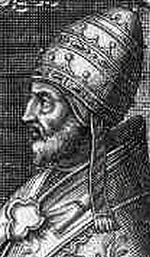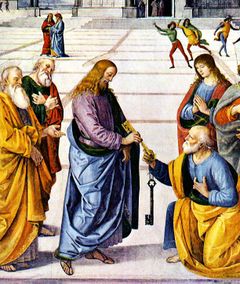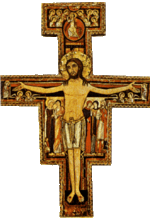Pope Adrian V
| Adrian V | |
|---|---|
 |
|
| Papacy began | July 11, 1276 |
| Papacy ended | August 18, 1276 |
| Predecessor | Innocent V |
| Successor | John XXI |
| Personal details | |
| Birth name | Ottobuono de' Fieschi |
| Born | c. 1210–1220 Genoa, Republic of Genoa, Holy Roman Empire |
| Died | August 18, 1276 Viterbo, Papal States, Holy Roman Empire |
| Other Popes named Adrian | |
Pope Adrian V (c. 1210/20 – August 18, 1276), born Ottobuono de' Fieschi, was pope in 1276.
Biography
Ottobuono belonged to a feudal family of Liguria, the Fieschi, Counts of Lavagna.
His first clerical position came in 1243, when he was created a papal chaplain. Subsequently he received several ecclesiestical benefices, becoming archdeacon in Bologna (1244) and Parma (1244/48–1255), canon and chancellor of the cathedral chapter in Reims (1243–1250), canon and dean of the chapter in Piacenza (ca. 1247) and canon of the cathedral chapter in Paris (1244/45–1270). In December 1251, he was created Cardinal Deacon of San Adriano by his uncle Pope Innocent IV (1243–54). He was also archpriest of the patriarchal Liberian Basilica (attested from 1262).

He was sent to England in 1265 by Pope Clement IV (1265–68) to mediate between Henry III of England (1216–72) and his barons, and to preach the Crusades; he remained there for several years as the papal legate, serving from October 1265 to July 1268. His diplomatic position was such that his name is still on the oldest extant piece of English statute law, the Statute of Marlborough of 1267, where the formal title mentions as a witness "the Lord Ottobon, at that time legate in England". (Also on this legation was a young diplomat, the future Boniface VIII.) In April 1268 he issued a set of canons, which formed the basis of church law in England until the reformation of the sixteenth century.
Under the influence of Charles of Anjou, he was elected Pope to succeed Innocent V on July 12, 1276, but died at Viterbo on August 18, 1276 without ever having been ordained to the priesthood; he is buried there in the church of S. Francesco. Technically, since Adrian V was never ordained bishop, he never truly became the Bishop of Rome, but traditionally he is counted in the papal succession.
He achieved little during his time as pope; he annulled Pope Gregory X's (1271–76) bull on the holding of papal conclaves, but died before enacting new regulations.
In the Divine Comedy Dante meets Adrian's spirit in Purgatory, on the level reserved for the avaricious, where Adrian is atoning for his sin of worldly ambition.
References
 "Pope Adrian V" in the 1913 Catholic Encyclopedia.
"Pope Adrian V" in the 1913 Catholic Encyclopedia.- Maxwell-Stuart, P. G. Chronicle of the Popes: The Reign-by-Reign Record of the Papacy from St. Peter to the Present, Thames & Hudson, 2002, p. 117–118. ISBN 0500017980.
- A. Paravicini Bagliani, Cardinali di curia e familiae cardinalizie dal 1227 al 1254, Padova 1972, p. 358–365
| Catholic Church titles | ||
|---|---|---|
| Preceded by Innocent V |
Pope 1276 |
Succeeded by John XXI |
|
|||||||||||||||||||||||||||||||||||||||||||||
|
|||||||||||||||||||||||||||||||||||||||||

